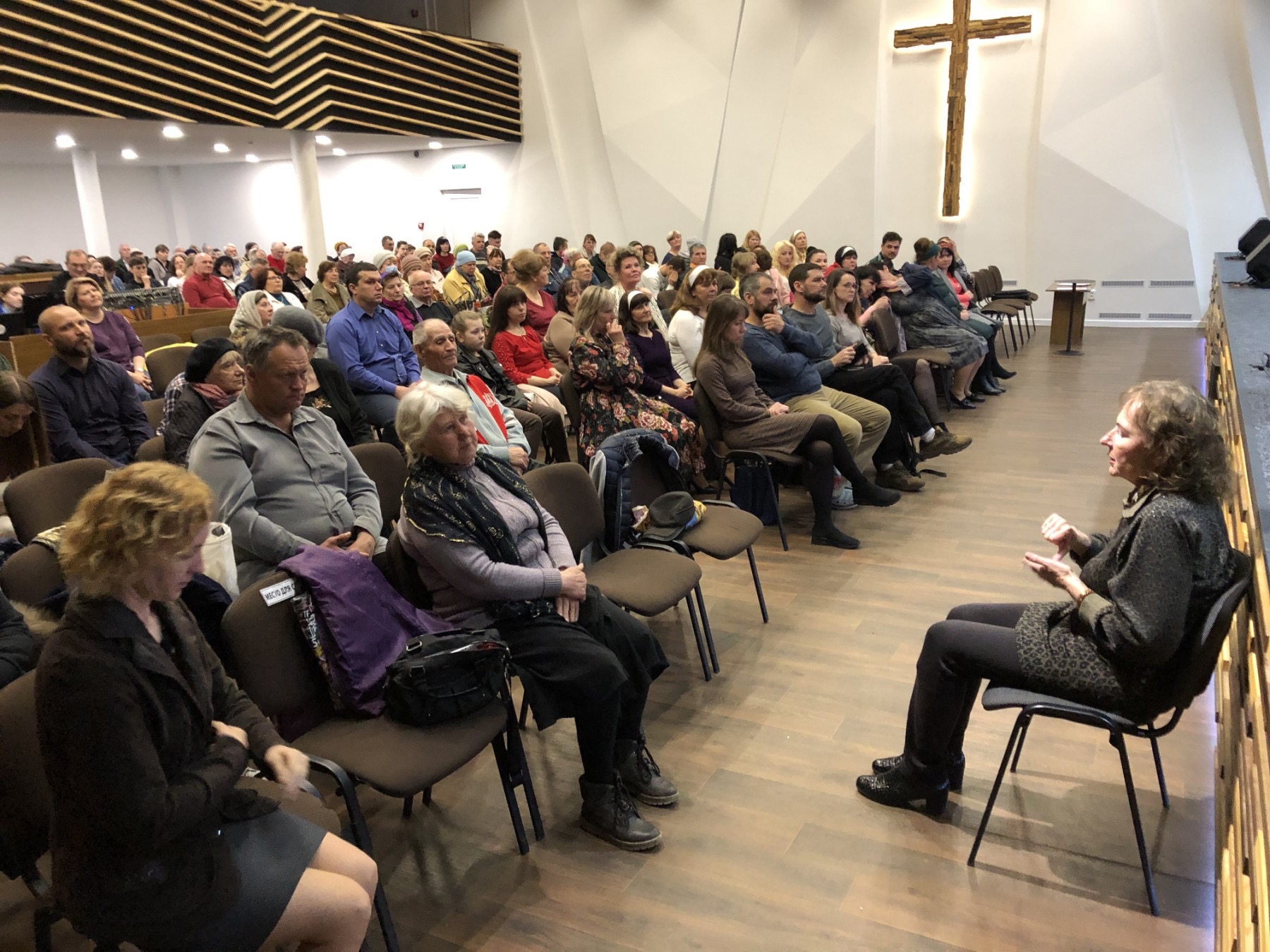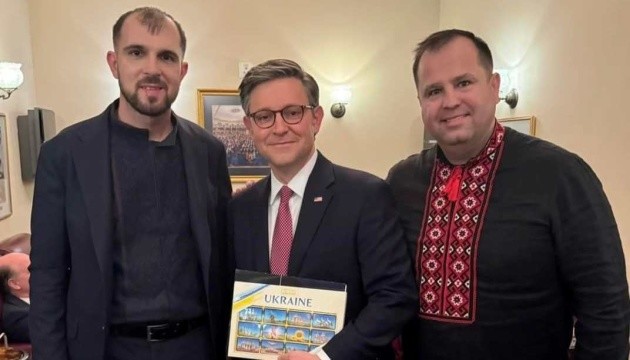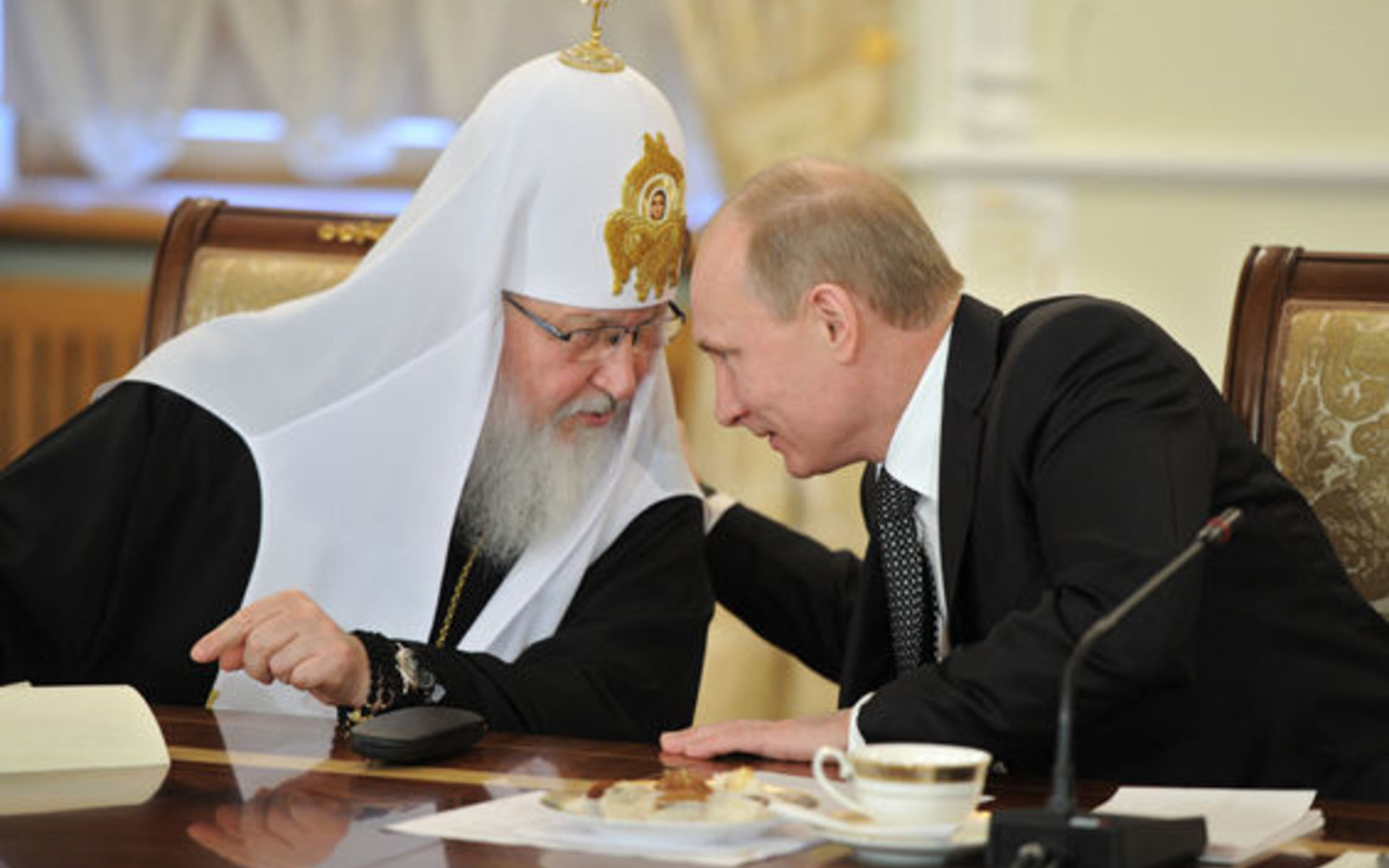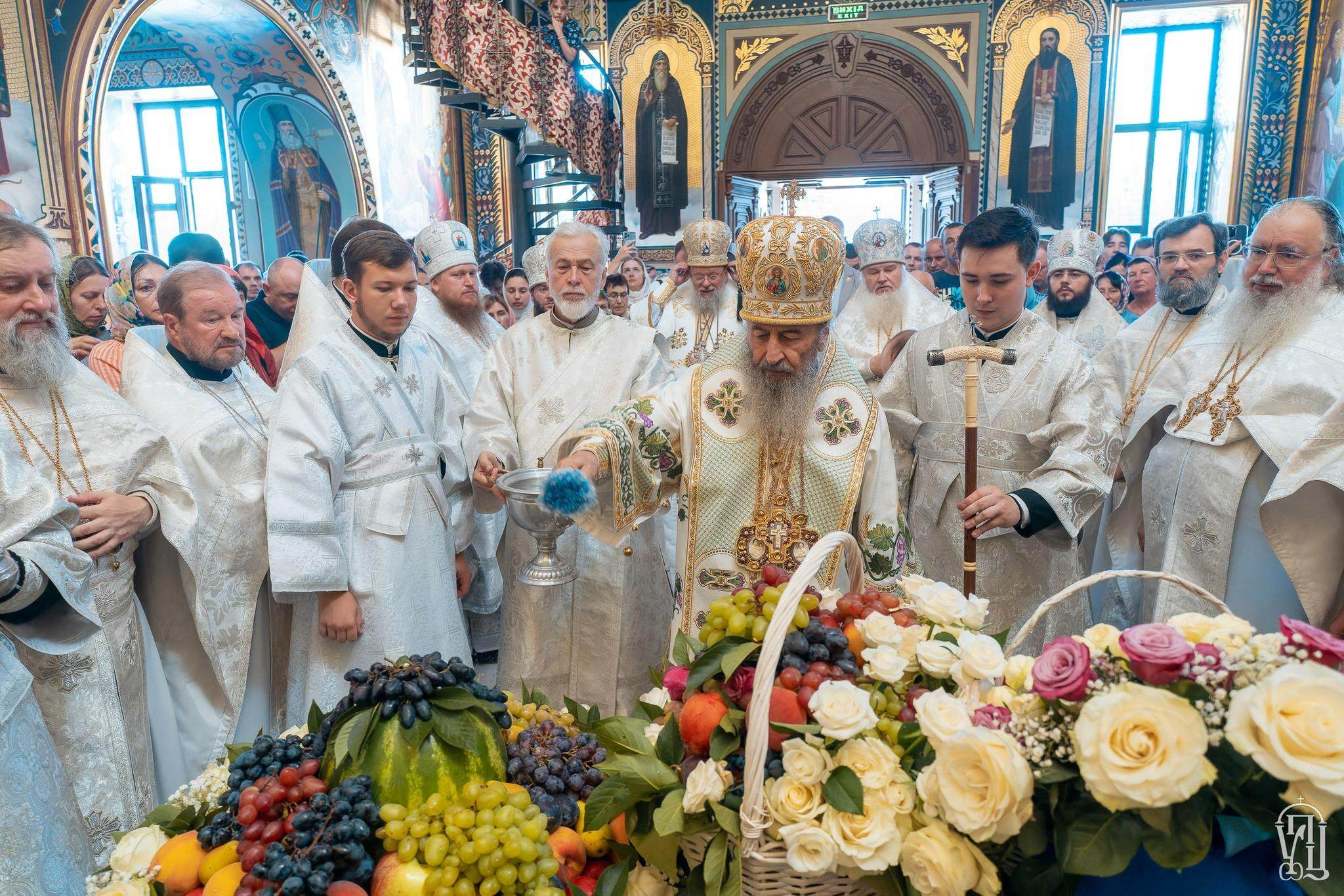Imagine a billionaire fleeing to Moscow after treason charges, then crying on Russian TV about American “Christian persecution.” That’s what just happened — in reverse.
Tucker Carlson just handed his platform to Vadim Novinsky — Russia-born fugitive worth $1.4 billion, wanted in Ukraine for treason — who echoed the Kremlin’s claims about Kyiv “persecuting Christians” from his European exile.
“Ukraine has launched a campaign of persecution against Christians,” declared Novinsky, attending Russian Orthodox services in Zurich while complaining to Western cameras.
Here’s what the Kremlin-linked oligarch forgot to mention: in occupied Ukraine, his beloved church system shoves needles under pastors’ fingernails to force them into Russian spies.
While Trump’s team signals Ukraine may never join NATO to appease Putin, the security state Putin built is electrocuting Protestants for being “American spies” — genuinely shocked that their churches aren’t already wiretapped.

The pastor Russia marked for death
Pastor Oleh — a minister whose name has been changed to protect his family — made one unforgivable choice: he helped Ukrainian war refugees.
His church was located in Berdiansk, a strategic city in southern Ukraine seized by Russian forces just three days into the full-scale war. Surrounded on three sides by the Azov Sea, it became a vulnerable outpost as Ukrainian troops rushed toward Mariupol, trying to save it from what became one of the war’s deadliest sieges.
At first, Pastor Oleh believed in Ukrainian liberation. He cheered when Russian flags were torn down in Kharkiv and Kherson — the only regional capitals Putin’s troops had managed to capture. However, each passing day in occupied territory brought greater risk, especially for someone leading a congregation.
While Protestants make up just 2–4% of Ukraine’s population, they account for nearly a third of all registered religious communities, while also championing the provision of humanitarian aid and social support.
Not surprisingly, Oleh’s Baptist church quickly became a hub for refugee support, especially for civilians fleeing besieged Mariupol.
“People simply lived in the church; we completely opened our doors, fed people, welcomed them… new people arrived every day,” Oleh told Euromaidan Press.
However, that compassion soon drew the attention of the Kremlin’s secret police. As soon as Russia’s Federal Security Service (FSB) entered the city, the pastor’s humanitarian work gave him a choice no sermon could prepare him for: spy for the occupiers, or face the consequences.
The Kremlin’s Holy Trinity: Church, State, and Surveillance
The Russian state has a long history of subordinating religion — a system inherited directly from the Soviet Union.
Despite its official atheism, the USSR reinstated the Russian Orthodox Church (ROC) after World War II to extend the Communist Party’s control and expand surveillance over the population. After the Soviet collapse in 1991, the Kremlin briefly lifted restrictions on religion — but that freedom lasted only two years.
By 1993, the ROC had successfully lobbied to ban foreign missionaries. Under Vladimir Putin’s rule, and with the rise of Patriarch Kirill — a former KGB agent — in 2009, religious repression deepened.
In 2017, Russia branded minority faiths like Jehovah’s Witnesses as “extremist,” while also banning independent missionary work — a direct blow to Evangelical churches, who made up half of those targeted.
As the Kremlin restored Soviet-style religious control, it also revived the secret service’s role in managing church life — an echo of the Soviet legacy where high-ranking clergy appointments required KGB approval.
The symbolic culmination came in 2002, when an Orthodox church was consecrated on the grounds of the FSB headquarters in Moscow — a project initiated by Putin himself, a former FSB chief. Since then, the Russian Orthodox Church has openly aligned with the security service in cracking down on “non-traditional” faiths, while Russia’s secret police actively persecute alternative faiths seen as competitors to the state-controlled church.
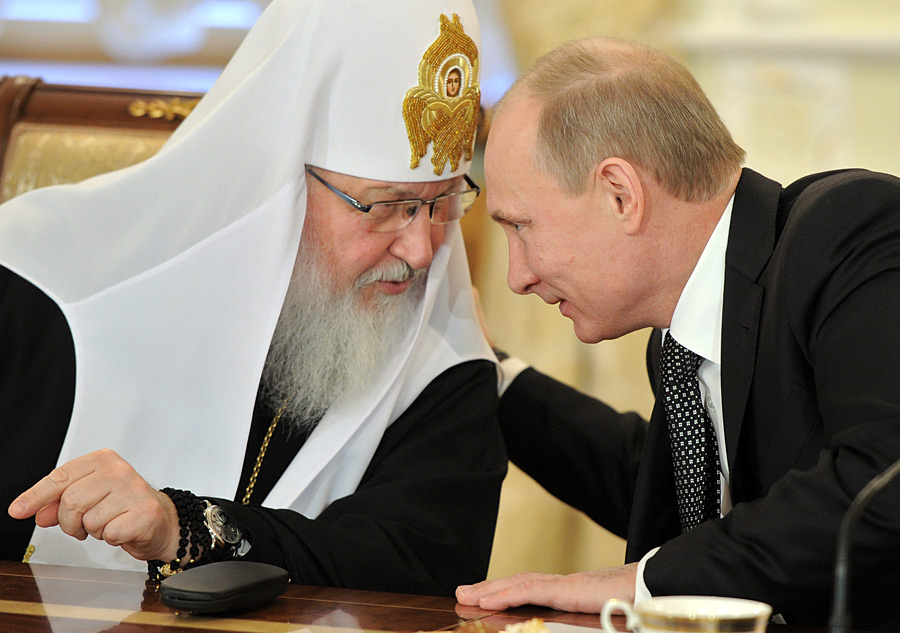
How Ukraine’s Protestants became Russia’s marked men
For Ukrainians who have found themselves under Russian occupation, religious freedom quickly turned from a right into a threat to be wiped out.
Unlike Russia, Ukraine’s 1996 Constitution enshrines freedom of religion, paving the way for more than 36,000 religious organizations across 100 denominations to register in the decades since. This protection has allowed various faiths to grow inside a mainly Orthodox nation, with only Protestants accounting for nearly a million believers before the full-scale invasion.
“In my 26 years as a Protestant, I had never experienced a ban on gathering or street evangelism,” said Pastor Viktor Cherniyavsky, from Luhansk — a city overtaken by Russia in 2014. “Ukraine has always been open and engaged with all denominations.”
However, this openness quickly collapsed under Moscow’s occupation. As the full-scale invasion trapped millions behind Russian lines, Ukraine’s Protestant pastors suddenly found themselves walking a razor’s edge — targeted simply for existing outside the Kremlin’s approved faith.
Russia’s holy war on Christian charity
Oleh from Berdiansk felt the contrast almost immediately. When agents from Russia’s Federal Security Service (FSB) entered the city, his congregation was quickly flagged for distributing humanitarian aid. In the eyes of the occupation authorities, this meant competing with Russian troops, whom the Kremlin portrayed as “liberators.”
“They didn’t accept people who helped unless it was under the Russian flag,” Oleh explained.
His story is far from unique. According to a report by Mission Eurasia, by summer 2022, Russian occupation authorities began treating church-run humanitarian work as a threat to their control. Aid was confiscated at checkpoints and eventually banned altogether if it came from Ukrainian-controlled territory.
“Russian trucks came, and people were given small food packages. The Russian press was always around… It looked like they were training animals. First, they take everything away from the people, then they toss them a pittance and compel them to love, rejoice, and obey,” one eyewitness testified.
Oleh remembers how pressure on Protestant churches quickly escalated. They were branded as “American churches” and their pastors as “American spies” — mirroring the Russian belief that any aid not controlled by the state is foreign subversion.
However, the crackdown on food and shelter was just the beginning. As Oleh recalls, this scrutiny soon spiraled into a full-scale campaign of repression against Protestant Christians — a purgatory unleashed with the blessing of the Russian Orthodox Church.

The grenade ultimatum: spy on your flock or die
The occupiers saw pastors and priests not as spiritual leaders, but as tools of influence. They threatened and pressured them to accept Russian citizenship — and to persuade their congregants to do the same. Without a Russian passport, they were told, they could no longer live or serve in the occupied territories.
But even those who complied weren’t spared. Pastors were coerced into acting as informants for Russian security services, expected to share private information heard during confessions. One day, they even handed Pastor Oleh a grenade.
“They threatened to kill my family if we attempted to leave,” he told Euromaidan Press.
When Russian agents demanded he identify church members with relatives in the Ukrainian military, Oleh refused — to their utter disbelief.
“I knew that some people in my church had children who served in the Ukrainian army. They [the Russians] wanted their names,” Oleh said. “But, of course, thank God, I didn’t say anything about them.”
The experience revealed something deeper: Russian authorities couldn’t grasp the idea of a church independent from the state. In their worldview, any pastor not spying must be a Western agent — a theme echoed across testimonies from occupied territories.
“They saw all churches as a threat, like American churches, American spies,” Oleh explains. “For them, all Protestants are a foreign faith; there should be one faith of the Moscow Patriarchate, no other churches.”
Russia’s Christian love: interrogate, threat, torture, repeat
The persecution of religious leaders in occupied Ukraine follows a pattern: first come interrogations, then threats, then the seizure of church buildings — and finally, arrests, torture, or deportation for those who refuse to cooperate.
Since the start of the full-scale invasion, Russian troops have killed or kidnapped at least 29 religious leaders. They reflect a deliberate, systemic policy — one exported from Russia and amplified across occupied Ukrainian territories, with the full backing of Kremlin propaganda.
“There are many different sects in the empire’s south,” said Ekaterina Arkalova, a propagandist on a TV channel founded by the Russian Orthodox Church. “Fighting those sects, all those Protestants and Jehovah’s Witnesses, is the main task of our counterintelligence in those territories.”
This wave of repression didn’t spare Oleh’s congregation. One of his church drivers — who had helped evacuate civilians from besieged Mariupol — was captured and held for 43 days.
“They tortured him very severely. He barely survived,” Oleh said.
Oleh knew his turn would come. Soon after, Russian troops banned his congregation from using their church building, forcing them to pray in secret at members’ homes for six months. His apartment became a makeshift sanctuary — until it, too, was stormed and ransacked.

Faith or flight: the pastor who outran Putin’s agents by one day
In the dead of night, 15 armed Russian soldiers stormed Oleh’s apartment and tore it apart. The first question they asked seemed ripped from another century: “How do you feel about the Soviet state?”
“We will teach you to love the motherland,” the soldier responded, hinting that Oleh was born in the USSR.
It was a warning — and a promise. From that night on, raids and interrogations became routine. So did the pressure to accept a Russian passport, the occupiers’ precondition for continuing to live and serve in the city. During one interrogation, Oleh asked how Protestant churches function inside Russia.
“Those churches are different,” one officer said, implying they had either been fully indoctrinated or were surviving under constant FSB pressure and surveillance.
By winter 2023, after nearly a year of living under the watchful eye of the FSB, Oleh made a decision: he would flee.
With all routes to Ukrainian-controlled territory sealed off by Russian forces, he and his wife and children attempted a high-risk escape through occupied Mariupol, across Russia, and into Estonia, a European Union country.
They drove with barely any rest, racing the clock so that Russian authorities wouldn’t notice their disappearance. They made it just in time: on the very day they crossed the border, the occupiers arrived at their home looking for him.
Today, Oleh lives in the Netherlands, where he continues to serve — this time as a pastor to a Ukrainian refugee community. He now speaks openly about the trauma he endured, hoping to expose the true nature of the “Russian world.”
“Without faith, it would have been very difficult for me not to break,” Oleh says, crediting divine protection for his family’s survival — a miracle many other persecuted clergy never received.
The Orthodox blessing of Protestant torture
Pastor Viktor Cherniyavsky, who escaped Russian captivity nearly a decade earlier, knows this experience all too well. He was abducted shortly after Russian forces seized his native city of Luhansk in eastern Ukraine in 2014 — a reminder of how little has changed in Russia’s torture playbook over the years.
“A clergyman of the Russian Orthodox Church tried to drive demons out of me and watched as I was tortured for being a Protestant,” he told Euromaidan Press. “He forced me to kiss a cross, pressing it against my face before stepping back to let the beatings continue.”
While imprisoned, Viktor read from a small New Testament that his wife had managed to deliver. After surviving the ordeal and witnessing Russia’s full-scale invasion in 2022, he made a decision: to join the Ukrainian military.
Knowing what the Russian occupation brings, he chose to defend others. He credits his survival to God’s protection, which he believes allowed him to escape captivity and make it back to Ukrainian-controlled territory.
Once the full-scale Russian invasion erupted, this experience — and knowing what Russian occupation brings to more Ukrainians and fellow believers — convinced him to join the Ukrainian army, relying on God’s protection he believes allowed him to be released from Russian captivity alive.

Viktor’s former congregation, however, saw another tactic Russia uses to control “non-traditional” faiths: forced replacement and religious rebranding.
“A pastor from Russia was sent to replace our original pastor, who had fled after receiving threats to his life,” he said.
Under Russian law, all religious groups except the Russian Orthodox Church can only function legally if they register with state-approved bodies — a process that effectively places them under the control of the FSB. In occupied Ukraine, many churches are allowed to continue operating only after agreeing to complete subordination to religious centers inside Russia.
However, even this pseudo-legal survival isn’t guaranteed. Pastor Oleh from Berdiansk recalled, Russian soldiers made no secret of their endgame.
“They said, ‘This is temporary. There will be only the Orthodox Church. We’re starting to sort things out here — and then we’ll sort them out back there,’” he recalled.
This campaign of erasure hasn’t spared anyone — not even the denomination that, by name and tradition, might seem least likely to face repression under Putin’s Orthodox crusade. Instead, it has become target number one in occupied Ukraine.
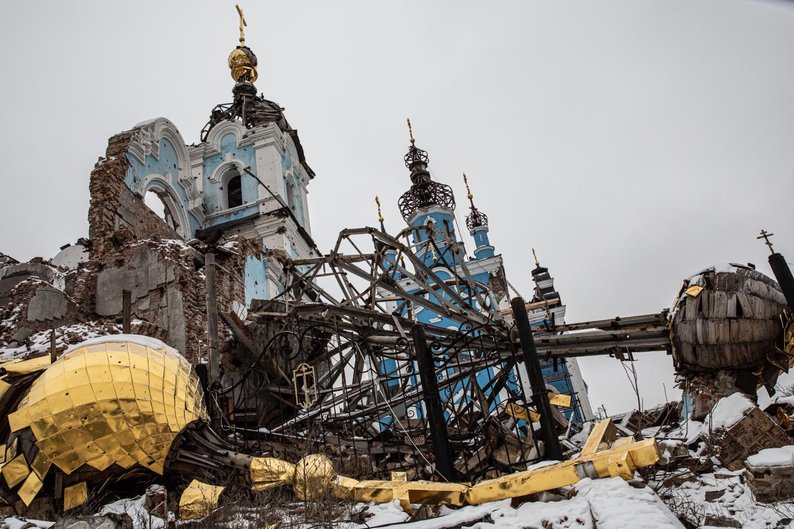
The church Putin fears most
Russia’s crusade against believers has inflicted its most brutal damage on the very community it claims to protect: Ukraine’s Orthodox Christians.
This persecution didn’t begin in 2022 — but it escalated rapidly after the Ukrainian church formally broke away from Kremlin control. Though the Ukrainian Orthodox Church had long distanced itself from Moscow, it was only in 2019 that its independence was officially recognized by the Ecumenical Patriarchate of Constantinople — the highest authority in the Orthodox Christian world.
That year, the newly-established Orthodox Church of Ukraine (OCU) was granted full religious autonomy as a self-governing national church.
The OCU’s legalization triggered a nationwide shift: parishes across Ukraine began transferring en masse from the Moscow-affiliated churches, including nearly 15% of Russian Orthodox parishes in Ukraine. Within a short time, the OCU became the largest Orthodox church in the country, dramatically shrinking the Kremlin’s religious influence.
Not coincidentally, the OCU and its clergy were singled out for systematic repression in the occupied territories.
Even priests from the Russian-affiliated churches — historically aligned with Moscow — were persecuted if they refused to pray for “the victory of Russian arms” or insisted on maintaining their Ukrainian identity.
“At first, they asked how our church differs from an Orthodox church. I said: we are Orthodox, just Ukrainian,” one priest told Euromaidan Press. “When they realized there was nothing they could use against us, they gave us an ultimatum: either transfer to the Russian Orthodox Church, or face repressions.”
“Pray for Russia or be tortured”: Inside Russia’s Orthodox Inquisition
Torture quickly became a defining feature of Russia’s approach to Ukrainian clergy. Father Vasyl Vyrozub, chaplain and rector of the Odesa Holy Trinity Cathedral of the Orthodox Church of Ukraine, was captured in the early days of the invasion. His testimony reveals the brutality masked by religious rhetoric.
“Two Russian soldiers forced me into the split position and stretched me; two of them were wringing my arms and legs, holding my head to the wall,” he recalled. “The third one was beating me from behind — on my kidneys, on my head — and with a stun gun.”
When the interrogators demanded information, the torture escalated:
“They twisted my arms, forced me onto my knees, and shoved a needle under my fingernail. All while shouting, ‘You will tell us. You will confess.’”
His refusal to sing the Russian national anthem during morning roll call — instead reciting The Lord’s Prayer — brought further punishment. Stripped naked and thrown into a freezing punishment cell (6–8°C or 43–46°F), he was left for four days without food, water, or sleep.
Throughout his captivity, Vasyl was subjected to special mistreatment because of his affiliation with the OCU. Russian interrogators kept demanding he admit which department of Ukraine’s Security Service (SBU) he worked for — unable to comprehend that a priest could exist outside state intelligence structures.
However, Father Vasyl’s ordeal is not an isolated case. Across occupied Ukraine, religious leaders have reported mock executions, electric shocks, threats of rape, and hours-long group beatings — the result of deliberate policy, enforced by the same Russian state that claims to be the guardian of global Orthodoxy.
From blessing war to stealing children: Russia’s holy crimes
The role of the Russian Orthodox Church in the invasion of Ukraine goes far beyond passive compliance.
During the full-scale invasion, the Church became a key Kremlin partner in war crimes. Its involvement has ranged from blessing Russia’s military aggression and spreading propaganda to more grave violations — such as facilitating the deportation of Ukrainian civilians, including children, to Russia, where many have been held in church-run facilities.
The ROC’s hostility to Ukrainian statehood didn’t stop at Russia’s border. Since the 2014 invasion, the Kremlin has actively relied on its Ukrainian proxy — the Ukrainian Orthodox Church of the Moscow Patriarchate (UOC-MP) — which before the war accounted for nearly 40% of all Orthodox churches in Ukraine.
Since 2022, Ukraine has opened over 100 criminal cases against ROC-affiliated priests for aiding Russia’s war effort. Other countries — including Bulgaria and North Macedonia — have expelled Russian clergy on espionage charges.
In response, in August 2024, Ukraine passed a law restricting the activities of religious organizations affiliated with the Russian Orthodox Church. The legislation gave such groups nine months to sever ties with Moscow and re-register under Ukrainian jurisdiction. Those that refused would be subject to legal termination.
Yet as of 2025, over 90% of UOC-MP parishes have failed to comply. Despite that, more than 8,000 ROC-linked churches still operate in Ukraine-controlled territory, despite Russia’s ongoing war.
Still, the Kremlin’s propaganda machine has seized the opportunity to push a message that Ukraine is the one persecuting religious believers. This narrative has found fertile ground in US conservative circles, even though nearly all UOC-MP churches still remain active within Ukraine.
Pastor Oleh, who lived under Russian occupation and now serves a refugee community in the EU, sees the distortion clearly:
“People who shout that there is no freedom in Ukraine… In Russia, you can’t even shout about it,” he said. “You have to think about it quietly — because the moment you think differently, something bad will happen to you. Such freedom as in Ukraine does not exist anywhere for believers.”




